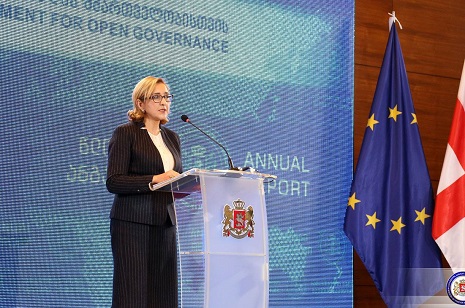Georgia's Foreign Minister sums up past two years

Signing the Association Agreement (AA) with the European Union (EU) and adoption of the NATO Substantial Package are among the top achievements of Georgia's Foreign Ministry in the past two years, says Foreign Minister Tamar Beruchashvili.
Beruchashvili presented a two-year report of her Ministry today and talked about the most important goals achieved by her team over the past two years.
The Minister outlined six most important issues, which were:
- Signing of the Association Agreement between Georgia and the EU;
- Adoption of the NATO Substantial Package at the NATO Wales Summit;
- Seeing a reduction in the number of states who recognise Georgia’s breakaway regions as independent states by two;
- Gaining significantly increased support by the UN on its resolution about Georgia’s internally displaced persons (IDPs) and refugees;
- Increasing the number of states with which Georgia has diplomatic relations with (now 183) and an unprecedented expansion of the diplomatic coverage area; and
- Increasing Georgia’s contribution to global security.
"The last two years were especially successful in terms of our relations with the European Union. Through our joint efforts we managed to initial, sign and to ratify the AA, including the Deep and Comprehensive Free Trade Area (DCFTA). Meanwhile, from the side of the EU, already 11 countries have ratified the agreement,” Beruchashvili said.
In addition, the Foreign Minister noted that during the past two years the Foreign Ministry had achieved significant progress in terms of the country's Euro-Atlantic integration.
"At the NATO Wales Summit Georgia received a Substantial Package of the North-Atlantic Alliance, which aims to prepare Georgia for joining the Alliance, as well as to strengthen the defence capabilities of our country,” she noted.
"In addition, a decision was made to establish a NATO-Georgian training centre and to hold joint exercises on a regular basis. We also agreed to strengthen the NATO Liaison Office and to develop the logistics and transport infrastructure of Georgia," Beruchashvili announced.
From 2012-2014 the top priority of Georgia’s foreign policy was strengthening the country’s sovereignty and territorial integrity.
"Through our proactive diplomacy and coordinated efforts of all the circles of the diplomatic system, in the years 2013-2014, two states – Vanautu and Tuvalu - retracted their decision to recognise our occupied territories as independent states,” she said.
Beruchashvili also spoke about Georgia-Russian relations and noted that the Russian Federation remained a challenge for Georgia.
"Georgian authorities tried to deescalate the tense relations with Russia. More specifically, the Government created a position of a special representative for relations with Russia, refused to boycott the Sochi Olympics and cooperated on security issues of the Olympics with Russia, started gradual normalisation of trade-economic and cultural-humanitarian relations,” she said.
"As a result it became possible to see some positive achievements in economic and cultural relations with Russia. However, it is still unachievable to have the same positive change in political aspects,” Beruchashvili noted.
Furthermore, the Foreign Minister said the Russian Federation continued its illegal actions towards Georgia in terms of installing barbed wire fences across the occupation line, including on the territory controlled by the Georgian Government.
"Moscow also signed a so-called 'Alliance and Strategic Partnership' treaty with the Abkhaz separatist regime and has been working on signing the same agreement with the Tskhinvali (South Ossetia) separatist regime as well. This is a de-facto annexation of integral regions of Georgia. This is a challenge that Russia creates not only for Georgia but for Europe and the whole world by willfully changing [internationally recognised] borders in 21st century Europe,” she said.
 Tweet
Tweet  Share
Share